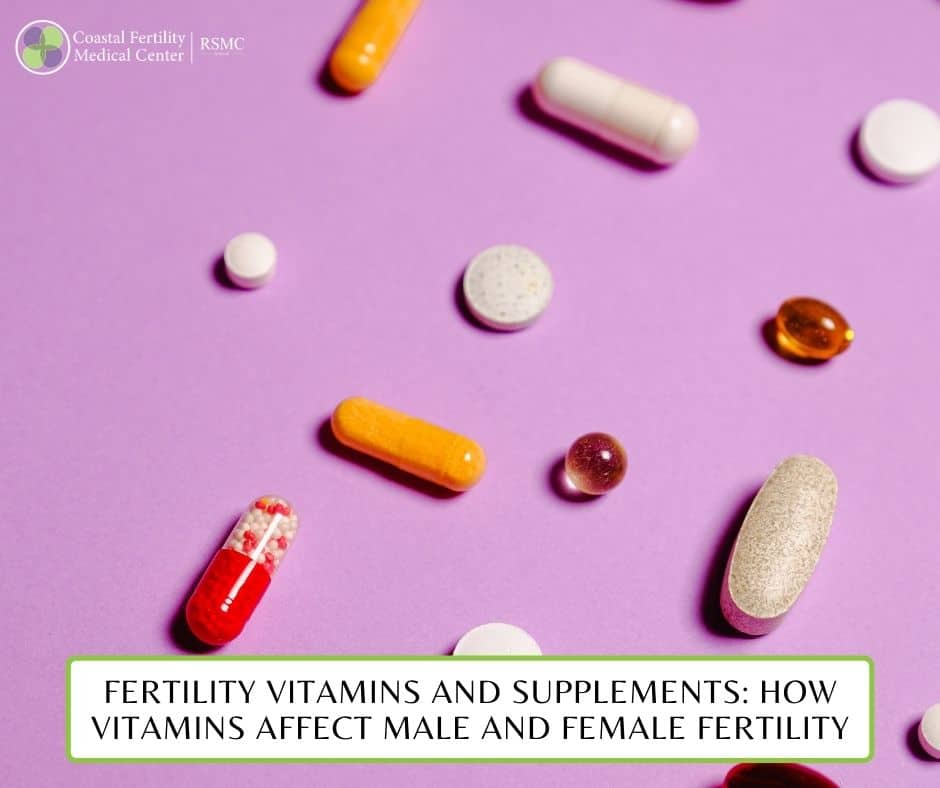About
Success
Treatment
Financial
Resources
Blog
Contact
Site Tools

Fertility Vitamins and Supplements: How Vitamins Affect Male and Female Fertility

Infertility is a difficult, trying experience for couples or individuals looking to have children. Unfortunately, the treatment options available for this condition can appear complex and overwhelming to hopeful parents. But there is one option to improve your fertility and chances of conception that is relatively easy: Your Diet – to be more specific, the micronutrients and vitamins you obtain from food or supplements.
Previously, we have discussed Food for Fertility and how it raises your chances of pregnancy. But these foods are valuable because they deliver the much-needed micronutrients to our body through diet. There are several vitamins and supplements that are known or claimed to help boost fertility in both men and women.
In this article, we will be looking at what vitamins and minerals are good for fertility and why.
Acetyl L-carnitine | Vitamin B| Vitamin C| Calcium | Coenzyme Q10 | Vitamin D | Vitamin E | Folic acid | Iron | DHA Omega-3s | Selenium | Zinc | Myo-inositol | L-Arginine | Melatonin
Role of Micronutrients in Fertility Health
Now, you may be thinking the role of vitamins in fertility is well understood. But this is not the case. The reason is that fertility is a difficult question to solve, and our bodies are not the same. Plus, the research on micronutrients, vitamins, supplements, and their impact on conception is still in the early stage.
However, some studies have started to shed light on the roles of vitamins in becoming and staying pregnant.
Vitamins play significant roles in female fertility health and are important for many functions in the woman’s body, such as:
- ovulation and menstruation
- energy production
- immune function
- thyroid function
- oocyte (egg) quality and maturation
Hence, adequate consumption of vitamins and minerals is essential in order to create a favorable environment for a healthy pregnancy. Certain nutrients can relieve the symptoms of polycystic ovarian syndrome – which is one of the common causes of infertility.
Research has also indicated that some supplements can improve sperm count and motility, making it is easier for the “little swimmers” to get to the eggs. However, it is crucial to note that more studies are needed on this.
According to health experts, although most of the studies conducted so far showed promising results, they involved a few numbers of participants and did not use a rigorous methodology.
Below is a breakdown of some common vitamins and supplements that can be helpful for fertility health and information on their dosage, usage, and effectiveness.
1. Acetyl L-carnitine
Who should take it:
Men and women.
Claimed Fertility Benefits
- Boosts sperm motility;
- Rich in antioxidants that support healthy reproductive system in women
Although Acetyl L-carnitine may not be the first thing that comes to mind when thinking of “vitamins’, that does not mean it is not worth considering. This supplement is an acetylated form of L-carnitine (LC) – an amino acid that is naturally found in the body and helps convert fat into energy.
ALC and LC are sometimes taken together to improve fertility in women.
Even though L-carnitine also helps with female fertility, a 2018 review has shown that acetyl L-carnitine (ALC) contains more potent antioxidants.
These two compounds are believed to delay age-related changes in the woman’s reproductive system. This study also showed that supplementing with ALC and LC reduced the symptoms of:
- Endometriosis
- PCOS (polycystic ovary syndrome)
- Amenorrhea (absence of a woman’s monthly period)
Other studies have indicated that both LC and ALC can improve sperm motility in men.
Dosage
The recommended amount to boost male fertility is around 1 to 3 grams daily for both ACL and LC. However, it’s crucial that you talk to your health provider before taking acetyl L-carnitine or carnitine supplements to ensure correct dosing and safety.
2. B vitamins (aside from folic acid)

Who should take it
Women and men.
Claimed fertility benefits
- Promote egg health and help prevent infertility due to an ovulation disorder.
- It may also boost sperm quality.
You may have been told that folic acid (vitamin B-9) is essential before and during pregnancy. However, other B vitamins also help with fertility.
According to the Nurses’ Health Study II – a prospective cohort study – a higher consumption of vitamins B-12, B-6, B-3, B-2, and B-1 can help reduce the risk of ovulatory infertility (when an ovulation disorder is the root cause of infertility).
Moreover, low levels of vitamin B-12 have been linked to infertility in women. Research has also indicated that having a higher level of vitamin B-12 and folic acid can improve fertility in patients undergoing infertility treatment.
Although more studies are needed, some experts claim that B vitamins can increase sperm quality, too.
Dosage
A B-complex multivitamin will give you enough amounts of most, if not all, of the recommended vitamin Bs per day.
3. Vitamin C

Who should take it
Men.
Claimed fertility benefits
- Increase sperm count and motility.
Vitamin C is a potent antioxidant that can lower cellular damage and improve the absorption of iron in the body. A review of several studies showed that, when taken together, vitamin C and E increased sperm count, mobility, and even DNA integrity in men.
Dosage
The recommended daily intake of Vitamin C is 90 mg (milligrams) for males and 75 mg for their female counterparts.
4. Calcium
Who should take it
Men and women.
Claimed fertility benefits
- Improves sperm production.
Although there’s no definitive study suggesting that extra calcium promotes fertility, men and women must take adequate amounts of this nutrient to prevent deficiencies. A 2019 research has linked calcium deficiency to infertility in men since it plays a role in sperm production.
Dosage
The recommended daily allowance of calcium for both men and women is 1000 milligrams per day. But unless you are suffering from calcium deficiency, it is better to obtain the mineral from healthy food sources, such as full-fat yogurt, instead of taking supplements.
5. Coenzyme Q10
Who should take it
Women and men.
Claimed fertility benefits
- Increases ovarian response during IVF (in vitro fertilization)
- Improves sperm motility.
Although coenzyme Q10 is naturally produced in the body, raising the amount of the compound in your blood can help with fertility, especially if you are pursuing IVF.
According to a 2018 study, pre-supplementation with coenzyme Q10 increased ovarian response in patients undergoing IVF.
New studies have also indicated that CoQ10 supplementation can raise sperm concentration and motility in infertile men. However, a 2013 review of previous studies and meta-analysis found no evidence that the coenzyme Q10 improves the chances of live births or pregnancy in women.
6. Vitamin D

Who should take it
Men and women.
Claimed fertility benefits
- Raises ovarian stimulation during IVF
- Improves semen quality.
This vitamin is given high importance for various fertility functions in both males and females. It’s another nutrient that may boost testosterone levels and studies have shown that its deficiency can lead to infertility. Therefore, it is important that people who are trying to conceive are tested for vitamin D deficiency.
Deficiency of vitamin D (the sunshine vitamin) has been linked to infertility in women. A 2019 study found that women experiencing infertility due to PCOS (polycystic ovarian syndrome) have low levels of vitamin D.
Seek your doctor’s advice regarding the right amount of the supplement to take, based on your current levels.
In a study involving mostly Caucasian and non-Hispanic white women, researchers found that participants with a normal level of vitamin D were more likely to conceive through IVF than those with a low level of the vitamin.
A meta-analysis examined whether there is a connection between vitamin D levels in the blood and the rates of live births in women undergoing fertility treatments. The researchers found that the live birth rates are significantly higher in women with a vitamin D level above 30ng/mL compared to those with lower levels.
Hence, achieving a normal level of the “sunshine vitamin” not only helps with fertility but also increases the chances of having a healthy, successful pregnancy. Besides, vitamin D deficiency during pregnancy has been shown to increase the risk of premature birth, gestational diabetes, bacteria vaginosis, and preeclampsia (extremely high blood pressure during pregnancy).
Dosage
While there is no conclusive data regarding vitamin D and fertility, many studies have linked vitamin D blood levels of around 30ng/mL or above to higher pregnancy rates.
Women who have a vitamin D level below 24ng/mL are advised to take 4000 IU daily, while those with a level of 24 -30 ng/mL should take 2000 IU per day.
Once the optimal level (30 ng/mL) is reached, 2000 IU of vitamin D should be taken every day to maintain a normal level.
7. Vitamin E

Who should take it
Men and women.
Claimed fertility benefits
- Improves sperm motility.
- Promotes female reproductive health.
Vitamin E is a powerful antioxidant that can promote women’s reproductive health in general and boost sperm function in men.
Dosage
The recommended daily allowance for adult men and women is 15 mg.
8. Folic acid
Who should take it
Women.
Claimed fertility benefits
- Helps with conception.
- Increases the success chances of fertility treatments.
Getting adequate amounts of folic acid is not only a good decision during pregnancy. It may also be wise thing to do when trying to become pregnant.
Taking folate supplements before pregnancy has been said to increase the chance of conception, improve the success rate of fertility treatments, and lower the risk of having a baby with neural tube defects.
Dosage
For expectant mothers, the recommended daily allowance of folic is 600 mcg (micrograms). However, women who want to get pregnant or may conceive are advised to supplement with a dose of 400-800 mcg folic acid per day, beginning at least one month before pregnancy.
9. Iron
Who should take it
Women.
Claimed fertility benefits
- Prevents anemia due to iron deficiency.
Iron deficiency can lead to ovulatory infertility, which may stop you from achieving a pregnancy. A large study of over 18,000 women indicated that supplementing with iron lowered the risk of ovulatory infertility.
However, if you have an ovulatory disorder, consult your healthcare provider on how to incorporate iron into your diet or how to use the supplement.
10. DHA Omega-3s
Who should take it
Women and men.
Claimed fertility benefits
- Improves sperm motility.
- Helps women above 35 to become pregnant.
What about those omega-3 fatty acids from fish and other dietary sources?
The consumption of seafood in a healthy diet has been linked with improved fertility in both men and women. If you don’t usually eat seafood (which is a good source of omega-3s), taking a supplement may be a worthy thing to do while trying to become pregnant.
11. Selenium
Who should take it
women and men.
Claimed fertility benefits
- Lowers the risk of miscarriage.
- Improves semen quality.
Selenium is an essential mineral that may play a role in male and female reproductive systems.
A 2015 study found that deficiency of this mineral can result in poor sperm mobility, low semen quality, and miscarriage. Another study conducted in 2019 suggests that selenium may help maintain the health of the biological fluid surrounding oocytes (female eggs).
Since the male body needs selenium to produce sperm, some studies have shown that a combination of selenium and vitamin E could boost sperm motility and semen quality.
Dosage
For adults, the recommended daily allowance for selenium is 55 mcg.
12. Zinc
Who should take it
Men and women.
Claimed fertility benefits
- Promotes fertilization and egg development.
- Enhances sperm quality.
Zinc is important for sperm production, and several studies have shown that its deficiency can result in low-quality sperm.
However, the connection between zinc and male fertility is yet to be proven. As a matter of fact, a 2020 study showed that dietary supplements containing folic acid and zinc did not boost sperm function, sperm count, or live birth rates.
Regarding zinc supplements and female fertility, a 2019 study has associated lower levels of zinc in the blood with a longer time to conception.
Dosage
Presently, the recommended daily allowance for zinc is 11 mg for men and 8 mg for women.
Some other male and female fertility supplements
13. Myo-inositol
Myo-inositol is a member of the vitamin complex found in cell membranes. It can help improve fertility, reduce weight, increase triglycerides, raise the levels of HDL cholesterol, and improve PCOS (polycystic ovarian syndrome) by reducing insulin resistance and hyperandrogenism.
14. L-Arginine
This is an amino acid that promotes cell division, hormone release, and immune function. L-arginine has been shown to improve fertility in women who have undergone several unsuccessful IVF cycles.
15. Melatonin
An excellent antioxidant that helps control the sleep-wake cycles (circadian rhythm).
Should you use a multivitamin instead?
Considering that there are many micronutrients that can impact fertility, it may be more convenient to take one high-quality multivitamin instead of buying many separate supplements.
It is recommended that you take a good, quality prenatal vitamin when trying to have children.
Women should search for a product containing at least 400 mcg (micrograms) of folate, 18 mg of iron, 150 mcg of iodine, 300 mg of chlorine, and a minimum of 600 IU vitamin D.
Men should look for a product that is rich in antioxidants, offering about 200% of the recommended daily value for vitamin E, Vitamin C, and zinc.
Risks of Using Supplements
Although most vitamins can be bought over the counter, that doesn’t mean that they are entirely risk-free. Some supplements can interact with medications you may be using, leading to unwanted side effects or worsening present medical conditions.
It may seem unlikely to overdose on vitamins, but there is a possibility of taking excess amounts of these supplements to the point that they become harmful. However, some micronutrients have certain tolerable intake levels – that is, the amount you can take before experiencing adverse effects.
To prevent overdosing, make sure to follow dosage instructions on the supplement’s label and seek your doctor’s advice before starting on any new supplement or vitamin.
Final words
There are a lot of contributory factors outside your control when dealing with infertility – your age, genetic makeup, an irregular cycle, to mention a few. Hence, before you head straight to your local food store, it is important to consult your doctor for advice and guidance.
But one thing you can control is your diet. So, make sure you provide your body with all the essential nutrients, including vitamins and minerals – to raise your chances of having a baby.
If you have more questions regarding vitamin intake for fertility health or infertility treatments, schedule a consultation with our doctors today.
Related Post
-
What is Azoospermia – Types, Causes, Symptoms, and Treatments
-
15 Things Doctors Want Women in Their 30s to Know About Their Fertility
-
Ovarian Hyperstimulation Syndrome (OHSS) – Causes, Risks, and Treatments
-
This IVF Pregnancy Success Video Is Going Viral On TikTok, And It’s The Most Adorable Announcement
-
End your week with these happy and heartwarming stories and videos
-
Fertility clinic shares IVF pregnancy success with parents-to-be in adorable video
Halloween 2019
Each year, Coastal Fertility Medical Center’s staff hosts a fun get together for our former patients and their families. View more photos from our 28th annual Miracle Babies Halloween event!Popular Searches
- Orange County Fertility Clinic
- Irvine, California Fertility Center
- Coastal Fertility Medical Center
- Free Fertility Seminar, Irvine CA
- In Vitro Fertilization and ICSI
- Best Orange County Infertility Doctor
- Southern California Fertility Specialist
- PGD, PGS Orange County
- Egg Donation and Surrogacy
Address
Coastal Fertility Medical Center15500 Sand Canyon Avenue
Suite 100
Irvine, CA 92618
©2024 | Sitemap | HIPAA/Privacy | Disclaimer and Privacy Policy
News from our Top Doctors

Our fertility clinic focuses on helping you build your family regardless of your sexual orientation or the gender you choose to identify with. We are even taking further steps to make LGTB people feel more welcome at our fertility clinic. Each of our patient-facing staff goes through LGTB training to let family-building clinicians provide necessary support and make you feel highly welcome.

Coastal Fertility Medical Center offers one of the most advanced fertility treatments and is completely transparent regarding the costs of procedures and any other expenses that you may have to pay before commencing your treatment. This differentiates us from some fertility clinics that reduce prices before the signing of the contract but charge you extra later on. We make sure our patients are well aware of any possible extra pricing that may occur over the course of their treatment.

The infertility industry is currently segmented, with each service or treatment being handled by a different provider. Our all-inclusive model simplifies an otherwise complex and difficult process. We are here to revolutionize the infertility industry by offering a one-stop-service model to assist our patients through infertility challenges while reducing physical, emotional, and financial risks.

Our globally respected team of specialists are helping improve IVF technologies to enter into a generation of better outcomes for infertility. Although you’ll have a doctor guiding you, you are also going to benefit from the experience and insights of other doctors during case review collaboration meetings, which take place every week. So, you won’t just rely on the expertise of a specialist but benefit from the knowledge of many reputed fertility experts.

Our team specializes in difficult cases and help patients who may have been considered “hopeless” at other fertility clinics. Thanks to our personalized solutions, expertise, and internal collaboration, weare able to maximize pregnancy success rates that are well above the industry average, even in difficult infertility cases.

We know that every situation is different and that everyone requires different treatments. Unlike facilities that take “a one-size-fits-all” approach for all cases, our fertility specialists use more than 40 customized protocols to raise the chances of success. The customized approach even extends to our fertility laboratory. Our on-site lab director and his highly-experienced team nurture every embryo and egg to increase the odds of success of each cycle.

Coastal Fertility Medical Center offers one of the most advanced fertility treatments and is completely transparent regarding the costs of procedures and any other expenses that you may have to pay before commencing your treatment. This differentiates us from some fertility clinics that reduce prices before the signing of the contract but charge you extra later on. We make sure our patients are well aware of any possible extra pricing that may occur over the course of their treatment.
Thanks for Joining!
We will be sending new updates soon.
You’re all set!
Your new patient forms have been submitted and received. We look forward to seeing you at your appointment.
Send us a message, we’ll be happy to answer any questions!
Please complete the form so we can best serve and help you with your journey towards parenthood.
On Demand Seminar Registration
Following the Preimplantation Genetic Screening process, which helps ensure there are normal chromosome numbers and detects possible genetic disorders, the most healthy embryo(s) are selected to be implanted into your or your chosen surrogate’s womb. 2 weeks after the transfer of the embryo, your physician will conduct a final blood test to determine the level of hCG (human chorionic gonadotropin) in your body. Increased hCG levels usually indicate a positive pregnancy test.

For fertilization to take place, the collected egg and sperm are combined in a petri dish and cultured in an embryo incubator. This dish is closely watched to check whether any of the eggs have been fertilized. Once the egg is fertilized, it is referred to as an embryo or a blastocyst on the 5th day of development. Our in-house embryologist carefully nurtures every embryo to the right time, even if it means working outside the standard business operating hours. For instance: If an oocyte is not mature, our laboratory will wait for it to mature and then ICSI it at the right time.

The egg retrieval is a slightly invasive medical procedure that takes about 20 to 30 minutes. You will be given an anesthetic to make you sleep for the duration of the procedure. Using ultrasound technology, your doctor will harvest your eggs transvaginally with a small, hollow needle connected to an ultrasound probe. Once your eggs are collected, your partner’s semen or donor sperm you have pre-selected is used for fertilization. The sperm are washed and prepared, and the top-quality sperm extracted is used to fertilize the eggs.

Your doctor will create a customized medication schedule that contains information about the fertility medications and hormone injections you have to take. Medication and injections are taken to encourage your ovaries to mature a large number of eggs for fertilization. Since women don’t respond to fertility drugs and hormones the same way, personalized protocols are crucial to the IVF cycle success. At Coastal Fertility, we will monitor you closely, letting you understand the changes occurring in your body and keeping track of how your egg follicles are growing.

On-site consultations typicallyinclude a standard fertility evaluation, consisting of a physical examination, complementary follicular ultrasound, and testing to enable your doctor to know your present fertility status and draw up a treatment plan.

This consultation includes a detailed medical evaluation with a doctor. You and your physician will review your health records and have enough time to talk about your goals and get answers to your questions. We recommend that you jot down all your questions before the visit to allow you to make the best use of the time spent with your doctor.

Your Reproductive Endocrinologist will take all factors into consideration and create a comprehensive plan of care, otherwise known as the treatment plan. This plan will include treatment recommendations from the physician and enable your financial coordinator to make a precise quotation once you meet.

Our globally respected team of specialists are helping improve IVF technologies to enter into a generation of better outcomes for infertility. Although you’ll have a doctor guiding you, you are also going to benefit from the experience and insights of other doctors during case review collaboration meetings, which take place every week. So, you won’t just rely on the expertise of a specialist but benefit from the knowledge of many reputed fertility experts.

The infertility industry is currently segmented, with each service or treatment being handled by a different provider. Our all-inclusive model simplifies an otherwise complex and difficult process. We are here to revolutionize the infertility industry by offering a one-stop-service model to assist our patients through infertility challenges while reducing physical, emotional, and financial risks.

Our fertility clinic focuses on helping you build your family regardless of your sexual orientation or the gender you choose to identify with. We are even taking further steps to make LGTB people feel more welcome at our fertility clinic. Each of our patient-facing staff goes through LGTB training to let family-building clinicians provide necessary support and make you feel highly welcome.

We know that every situation is different and that everyone requires different treatments. Unlike facilities that take “a one-size-fits-all” approach for all cases, our fertility specialists use more than 40 customized protocols to raise the chances of success. The customized approach even extends to our fertility laboratory. Our on-site lab director and his highly-experienced team nurture every embryo and egg to increase the odds of success of each cycle.

Our team specializes in difficult cases and help patients who may have been considered “hopeless” at other fertility clinics. Thanks to our personalized solutions, expertise, and internal collaboration, weare able to maximize pregnancy success rates that are well above the industry average, even in difficult infertility cases.

Upon your arrival, you will check in with a Patient Care Coordinator. We will obtain your insurance information for benefits verification, a copy of your identification and take a picture for your electronic medical chart
Welcome to Coastal Fertility Family
Coastal Fertility is the leading provider of fertility solutions located in Orange County. Join us to get free updates on fertility news, treatments, infertility solutions and more.
Welcome to Coastal Fertility Family
Coastal Fertility is the leading provider of fertility solutions located in Orange County. Join us to get free updates on fertility news, treatments, infertility solutions and more.





































